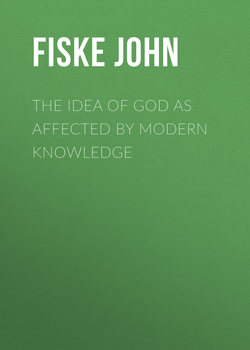Читать книгу The Idea of God as Affected by Modern Knowledge - Fiske John - Страница 3
II
ОглавлениеThe Rapid Growth of Modern Knowledge
At no time since men have dwelt upon the earth have their notions about the universe undergone so great a change as in the century of which we are now approaching the end. Never before has knowledge increased so rapidly; never before has philosophical speculation been so actively conducted, or its results so widely diffused. It is a characteristic of organic evolution that numerous progressive tendencies, for a long time inconspicuous, now and then unite to bring about a striking and apparently sudden change; or a set of forces, quietly accumulating in one direction, at length unlock some new reservoir of force and abruptly inaugurate a new series of phenomena, as when water rises in a tank until its overflow sets whirling a system of toothed wheels. It may be that Nature makes no leaps, but in this way she now and then makes very long strides. It is in this way that the course of organic development is marked here and there by memorable epochs, which seem to open new chapters in the history of the universe. There was such an epoch when the common ancestor of ascidian and amphioxus first showed rudimentary traces of a vertebral column. There was such an epoch when the air-bladder of early amphibians began to do duty as a lung. Greatest of all, since the epoch, still hidden from our ken, when organic life began upon the surface of the globe, was the birth of that new era when, through a wondrous change in the direction of the working of natural selection, Humanity appeared upon the scene. In the career of the human race we can likewise point to periods in which it has become apparent that an immense stride was taken. Such a period marks the dawning of human history, when after countless ages of desultory tribal warfare men succeeded in uniting into comparatively stable political societies, and through the medium of written language began handing down to posterity the record of their thoughts and deeds. Since that morning twilight of history there has been no era so strongly marked, no change so swift or so far-reaching in the conditions of human life, as that which began with the great maritime discoveries of the fifteenth century and is approaching its culmination to-day. In its earlier stages this modern era was signalized by sporadic achievements of the human intellect, great in themselves and leading to such stupendous results as the boldest dared not dream of. Such achievements were the invention of printing, the telescope and microscope, the geometry of Descartes, the astronomy of Newton, the physics of Huyghens, the physiology of Harvey. Man's senses were thus indefinitely enlarged as his means of registration were perfected; he became capable of extending physical inferences from the earth to the heavens; and he made his first acquaintance with that luminiferous ether which was by and by to reveal the intimate structure of matter in regions far beyond the power of the microscope to penetrate.
